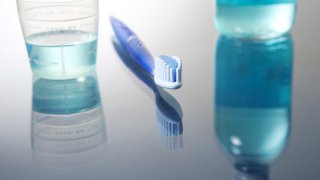
- The study from Cardiff University, which has not yet been peer-reviewed or published in a medical journal, suggests that some widely-available mouthwashes could help to kill the virus in saliva.
- However, this does not mean they would be able to treat the virus within the body, or act as a cure.
- The preliminary results come ahead of a clinical trial at the University Hospital of Wales that will examine how effective mouthwash is in reducing the amount of coronavirus found in the saliva of Covid-19 patients.
Commonly-used mouthwashes are able to kill the coronavirus within 30 seconds of exposure in laboratory conditions, a new study from scientists in the U.K. has found.
The study from Cardiff University, which has not yet been peer-reviewed or published in a medical journal, suggests that some widely-available mouthwashes could help to kill the virus in saliva. However, this does not mean they would be able to treat the virus within the body, or act as a cure.
The preliminary results come ahead of a clinical trial at the University Hospital of Wales that will examine how effective mouthwash is in reducing the amount of coronavirus found in the saliva of Covid-19 patients.
The researchers, from Cardiff's Systems Immunity Research Institute, tested how effective a handful of mouthwashes containing ethanol/essential oils, cetylpyridinium chloride (CPC) and povidone-iodine (PVP-I) were at eradicating the virus, finding that three of the mouthwashes they tried eradicated the virus completely.
Out of these three products, two contained at least 0.07% CPC and the third contained 23% ethanol with ethyl lauroyl arginate (LAE).
Money Report
Dr. Richard Stanton, lead author on the study and a reader in virology at Cardiff University, said: "This study adds to the emerging literature that several commonly available mouthwashes designed to fight gum disease can also inactivate the SARS-CoV-2 coronavirus (and other related coronaviruses) when tested in the laboratory under conditions that are designed to mimic the oral/nasal cavity in a test tube."
The results of the upcoming clinical trials are expected early next year. Stanton said it was important to see how long the virus lasts for in the throat and whether mouthwashes "could help reduce transmission, for example in dental investigations, mouth/throat examinations by GPs (doctors), or short-term contacts with vulnerable patients or other individuals."
He urged that people should continue to follow the preventive measures, including washing hands frequently and maintaining social distance.






